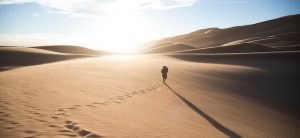
BS”D
Volume 34, No. 14
28 Tevet 5780
January 25, 2020
Sponsored by
Martin and Michelle Swartz
on the yahrzeit (3 Shevat)
of Martin’s grandmother
Elise Hofmann (née Kemeny) a”h
We read near the beginning of our Parashah that Moshe spoke Hashem’s words to Bnei Yisrael, “but they did not heed Moshe, because of shortness of breath and hard work.” R’ Tzaddok Hakohen Rabinowitz z”l (1823-1900; Chassidic Rebbe in Lublin, Poland) explains this verse in light of the Midrash Rabbah, which records that, when the young Moshe lived in Pharaoh’s palace, he convinced Pharaoh that slaves work more efficiently when they are given one day of rest each week. Pharaoh instructed Moshe to implement this idea, and Moshe arranged for Bnei Yisrael to have Shabbat as a day off. Later, at the end of last week’s parashah, we read that Pharaoh decreed (5:9), “Let the work be heavier upon the men and let them engage in it; and let them not pay attention to false words,” i.e., he took away their day of rest so they would have no time to think about redemption. R’ Tzaddok writes: Shabbat itself is a source of Emunah / faith. Thus, when Shabbat was taken away from Bnei Yisrael, their Emunah was lost as well.
This requires explanation, however, for Moshe Rabbeinu himself attributed the initial failure of his mission to his having a speech impediment (“aral sefatayim”). R’ Tzaddok notes that Moshe used different words to describe his speech impediment in last week’s Parashah (“kevad peh”). Hashem had already promised to heal that condition, but now Moshe’s speech was impeded for a different reason. As Bnei Yisrael’s leader, his ability to speak effectively to Pharaoh was proportional to the level of Bnei Yisrael’s Emunah. That, as noted, was tied to their Shabbat observance. (Pri Tzaddik: Va’era 7)
********
“Elokim spoke to Moshe and said to him, ‘I am Hashem. I appeared to Avraham, to Yitzchak, and to Yaakov as Kel Shakkai, but with My Name Y-K-V-K I did not make Myself known to them’.” (6:2-3)
R’ David Tevel z”l (1792-1861; rabbi of Minsk, Belarus) explains as follows: At the end of last week’s Parashah, Moshe exclaimed (5:23), “From the time I came to Pharaoh to speak in Your Name, he did evil to this people, and You did not rescue Your people.” Moshe was wondering: What is giving Pharaoh the courage to resist Hashem’s warnings and reject the signs that I performed? Moshe concluded: According to the natural order that G-d created, a nation cannot be subdued until its guardian angel is subdued. Pharaoh’s stargazers have told him that the angel of Egypt has not been subdued; therefore, Pharaoh is confident that Egypt cannot be subdued either. Thus, Moshe’s question at the end of last week’s Parashah meant: Since the guardian angel of Egypt has not yet been subdued, what is the point of my going to Pharaoh? Why did You send me?
R’ David Tevel continues: In our verse, Hashem explains to Moshe why his reasoning is incorrect. It is true, says Hashem, that I created a natural order to which the gentile nations are subject. Within that system, each nation has a guardian angel, and no nation can subdue another nation unless the former nation’s guardian angel first subdues the latter nation’s guardian angel. That natural order is alluded to by the Divine Name “Shakkai” (Shin-Dalet-Yud), one of the Divine Names that indicates that G-d is the Master of nature. When He reveals Himself as Shakkai, G-d can cause a nation’s guardian angel to be subdued, which, in turn, allows that nation’s downfall to occur “naturally.”
But, says Hashem, I have another Name, “Y-K-V-K.” When I reveal Myself by that Name, the rules of nature no longer apply. Likewise, the rule that a nation’s guardian angel must fall before the nation itself falls is not in effect when I reveal Myself by the Name Y-K-V-K. Therefore, it is irrelevant that Pharaoh saw that Egypt’s guardian angel was still at the height of its power; I will still subdue Egypt and take Bnei Yisrael out of Egypt. (Derashot Bet David, Drush 12:40)
********
“The fish that is in the water shall die . . .” (7:18)
R’ Eliezer David Gruenwald z”l (1867-1928; Hungarian rabbi and Rosh Yeshiva) asks: Why was this included in Moshe’s warning to Pharaoh? Obviously, if the Nile turns to blood, all of the fish will die!
He explains: Pharaoh’s magicians ostensibly mimicked the plague and turned water to blood. However, what they actually did was an illusion; the water did not turn to blood but just looked like blood. Anticipating that, Moshe warned Pharaoh, “When I turn the Nile to blood, it will be the real thing and the fish will die.” (Keren L’David)
********
“Egypt could not drink water from the River, and the blood was throughout the land of Egypt.” (7:21)
Midrash Rabbah relates that even if an Egyptian and one of Bnei Yisrael drank from the same cup, the Egyptian would find the liquid to be blood, while the Jew would have water.
R’ Yaakov Aryeh Guterman z”l (1792-1874; Chassidic Rebbe in Radzymin, Poland) notes that this miracle involving water foreshadowed the splitting of the Yam Suf. He writes: The Gematria of “Mayim” / “water” equals 91 (40+10+40, plus 1 to represent the whole word). This is equal to the combined Gematria of the Divine Name “Y-K-V-K” (a Name that denotes Divine mercy) plus the Divine Name spelled “Aleph-Dalet-Nun-Yud” (a Name that denotes Divine justice). Both in the case of the Plague of Blood and in the case of the Splitting of the Sea, the water was an instrument of mercy to Bnei Yisrael and an instrument of justice to the Egyptians. (Bikkurei Aviv)
********
“‘Entreat Hashem — there has been an overabundance of G-dly thunder and hail . . .’
“Moshe said to him, “When I leave the city I shall spread out my hands to Hashem; the thunder will cease and the hail will no longer be . . .’
“Moshe . . . stretched out his hands to Hashem; the thunder and hail ceased and rain did not reach the earth.
“Pharaoh saw that the rain, the hail, and the thunder ceased, and he continued to sin; and he made his heart stubborn, he and his servants.” (9:28-29, 33-24)
Why, in fact, did Pharaoh continue to sin? R’ Shlomo Kluger z”l (1784-1869; rabbi of Brody, Galicia) explains:
Pharaoh seems to have been more afraid of the thunder than of the hail; thus, he asked Moshe (verse 28) to pray first that the thunder stop and only then the hail. Moshe agreed to Pharaoh’s request (verse 29) and Hashem accepted Moshe’s prayer (verse 33).
However, Hashem had His own calculations as well. Midrash Rabbah teaches that the hail that was in the process of falling when Moshe prayed for the plague to end stopped in mid-air and remained there for future use (see Yechezkel ch.13). Hashem did stop producing thunder when Moshe prayed for the thunder to end, and hail when Moshe prayed for the hail to end. But, the last hailstones never reached the earth; rather, they gathered in the atmosphere. Thus, from Pharaoh’s vantage point, the hail stopped (i.e., it stopped reaching the ground) while he could still hear the thunder. The hail appeared to end first (verse 34). Thus, Pharaoh believed that Moshe’s prayer had not been answered; rather, the whole incident seemed to have been a coincidence, so there was no reason for Pharaoh to change his ways.
Perhaps, concludes R’ Kluger, Hashem did this so that Pharaoh could continue to rationalize his refusal to let Bnei Yisrael go. (Imrei Shefer)
********
Letters from Our Sages
This letter was written by R’ Avraham of Slonim z”l (1809-1883), the first Slonimer Rebbe, to a Chassid in Eretz Yisrael. It is printed in Yesod Ha’avodah – Michtevei Kodesh, no.30.
Shalom, etc.
Regarding your request for advice on how to act in our Holy Land, I will tell your honor what my teacher [R’ Noach z”l] from Lechovitch used to say, “I shall advise you, and may G-d be with you” [quoting Shmot 18:19]. In whatever you do, look for ways to come closer to Hashem, seek His assistance, and rely on Him and His many kindnesses. The travails you encountered on the way and the great expense you incurred are part of the suffering through which Eretz Yisrael is acquired. [Ed. note: This is a reference to our Sages’ teaching that three things can be acquired only through suffering: Eretz Yisrael, Torah, and Olam Ha’ba.] As for the future, may the words of R’ Mordechai [z”l from Lechovitch], may his merit protect us, be fulfilled. [He said that] “Yissurin” / “suffering” is related to “Assur” / “bound together”; [that is, through your suffering may your] soul be bound to the holiness of the Land which G-d watches over always [paraphrasing Devarim 11:12], meaning that there are fewer barriers [between G-d and man in Eretz Yisrael], since it is not watched over by guardian angels. This [i.e., being closer to G-d] is both a thorn and a benefit, for it means that a person must watch himself very carefully so that he, himself, will be in the Holy Land. By “he, himself,” I mean his soul . . . otherwise, his body will be in Eretz Yisrael and his soul will not be. First, the main thing is to review the belief that the holiness of the Land is very great. And, one should be intensely joyous that he is living there in the “land of the living,” where the gate of Heaven is. If one desires to purify himself [there], the assistance he gets [in Eretz Yisrael compared to elsewhere] is like the difference between trying to lift a heavy load from its center versus trying to lift it from one edge. Also, because of its great holiness, one who arrives there is like a new-born; therefore one [should take advantage and should] make the effort so that the verse (Eichah 3:23), “They are new every morning; great is Your faithfulness,” will be fulfilled in him.


